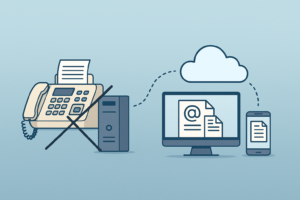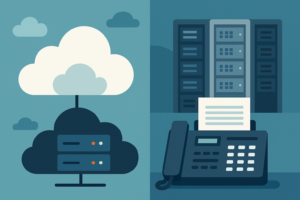To say that college sports are a huge deal in the United States would be an understatement. Collegiate football, specifically, has taken center stage in the fall for as long as it has drawn national attention. Out of all the milestones that come with every season, National Football Signing Day – the first day on which student-athletes are able to commit to one of the universities that has scouted their talents – is one of the most interesting.
The fascinating part about Signing Day is not necessarily due to the anticipation surrounding the decisions of high school athletes regarding what colors they will wear when they take the field, but because of how they submit their letters of intent. While it has become somewhat of a relic as far as the general public is concerned, faxing still has a welcome place in the traditions of college football – even now that email is considered an acceptable means of submitting intent.
"National Signing Day, aka the day when the nation's few remaining fax machines get their yearly workout," wrote The Washington Post contributor Matt Bonesteel. "Recruits are no longer required to use fax machines to send in their national letters of intent – they may be filed via email – but many still choose to do so. And so Twitter is aflame with photos of fax machines."
It is safe to say that the fax machine holds the same kind of significance for college football fans that vinyl records do for music enthusiasts. There is a charm and a tradition behind these devices. This may come from dreams of filing intent that began before the arrival of email. Football is a sport rooted in history and culture, and for many, the fax machine has played such an important part in the mythology that universities are dragging them out every fall in order to keep the story of Signing Day alive.
But faxing occurs so much more frequently than just for one day on the college football calendar. There are a vast number of organizations across all industries that are required by law to transmit certain kinds of information via fax. This has to do either with existing language in the laws pertaining to the sharing of information or a desire for stronger encryption than email is capable of providing. More companies, however, are realizing that fax technology is not dependent on the use of legacy hardware. As such, online and cloud-based faxing are becoming popular alternatives to siloed machines.
The implication of online faxes for Signing Day
Even if major universities continue to use their legacy systems on National Football Signing Day, it's likely that the high schools that student athletes come from will have to make some upgrades before the end of next one rolls around. Now that the federal E-rate program has been updated to better provide educational facilities with the information services that they need, discounts on things like landline fax connections will begin to disappear over the course of the next five years.
"In addition to raising the E-rate's annual spending cap to $3.9 billion, the FCC over the past year has approved big changes to the services that will be prioritized and supported," wrote Education Week contributor Benjamin Herold. "The new focus is on expanded broadband access and funds for internal Wi-Fi networks. Support for 'legacy' services, such as telephones and pagers, will be gradually phased out."
Fax machines generally are not found in personal homes these days, meaning that many students only have access to them when they are at school. But just because funding will stop does not mean that faxing will disappear. Since fax technology is still a strict requirement in industries like government, healthcare, and education, many schools are evaluating cloud-based or online faxing alternatives that can better meet their needs. These kinds of systems, like the VoIP technology that is pushing people away from landline telephones, will still be covered by E-rate as the transition continues.
But the end of legacy systems does not mean the end of a storied Signing Day tradition. Cloud-based and online faxes can be sent from computers and smartphones to older hardware – and vice versa. This means that schools can remain compliant and well-funded without depriving their student-athletes of a moment they may have been waiting their whole lives for.
Education needs online faxing
Faxing in K-12 schools is undergoing a transition. As mobility and the cloud continue to take over, it will be important to update faxing capabilities so that they are relevant to the modern user.
Enhance enterprise communication, collaboration and compliance efforts with a proven FoIP solution from FaxCore. Contact FaxCore today to learn more about their 'Partly-Cloudy' fax solutions.




